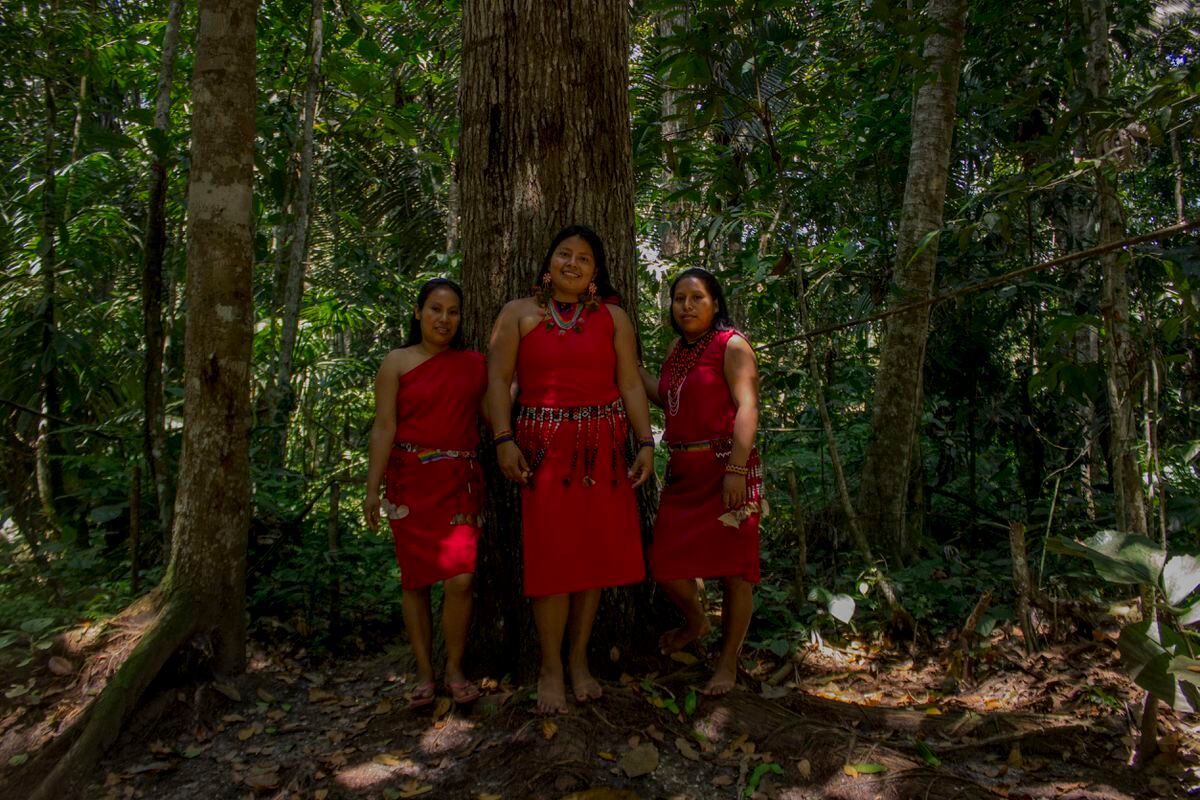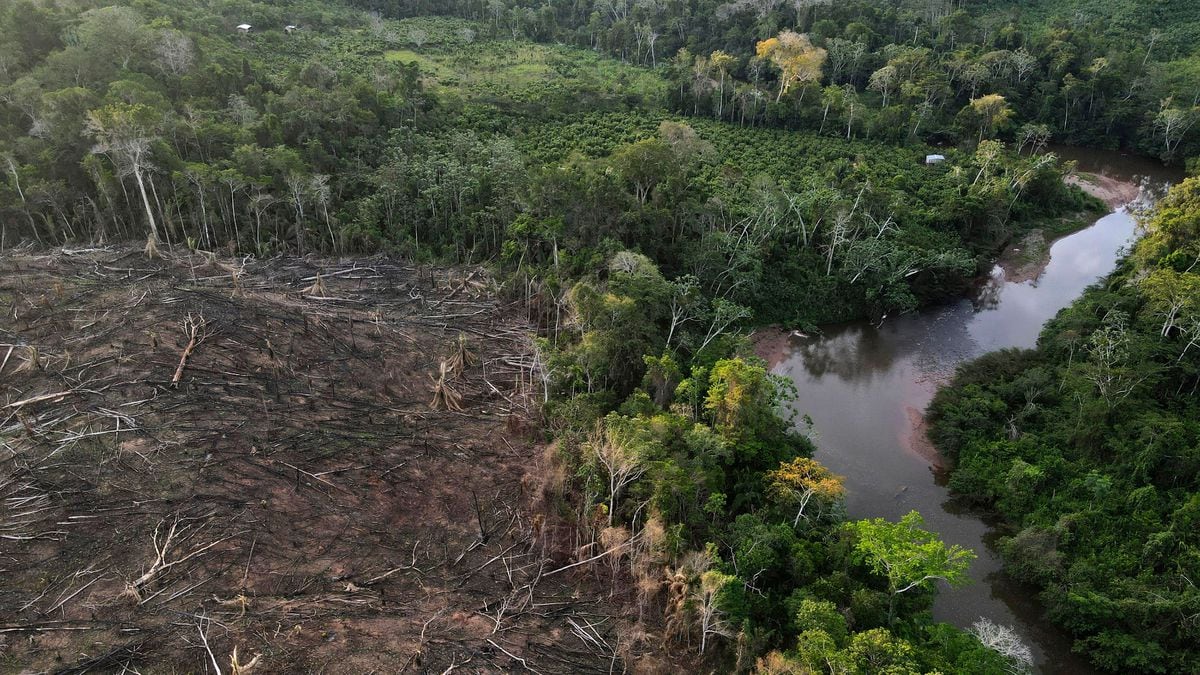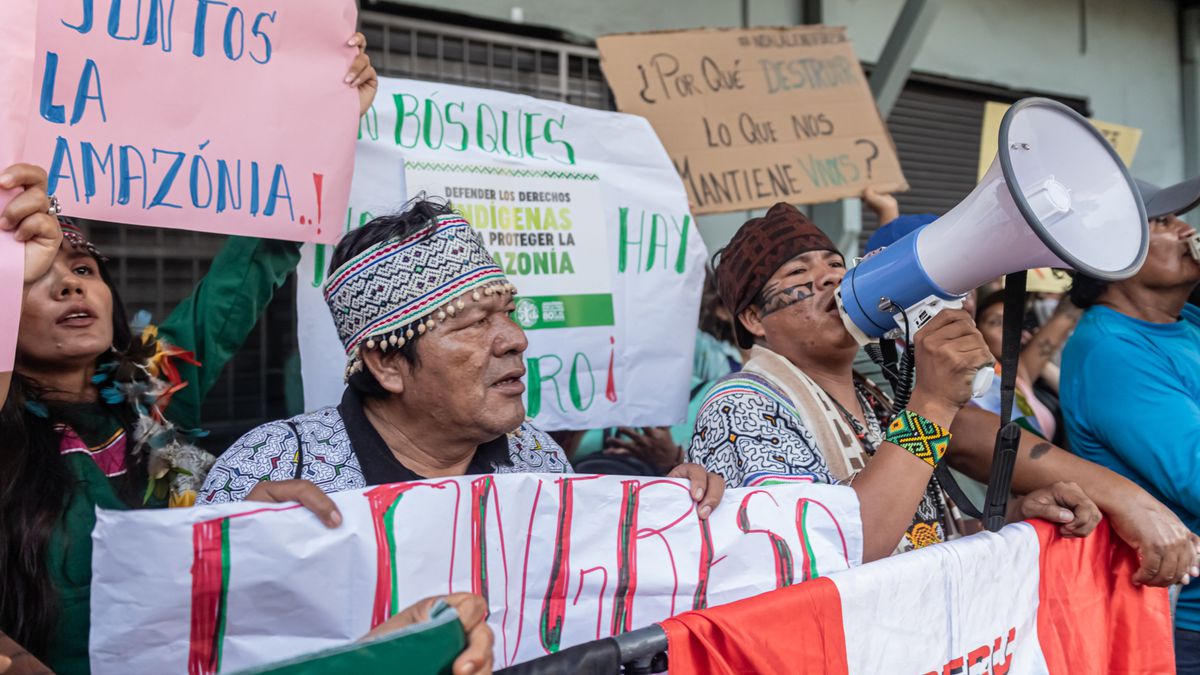Before entering the forest, Ruth Cumbia Sejekam embraces a towering tree, whose crown extends as far as the eye can see.
She takes a deep breath, thinks about everything negative and leaves it there, at the foot of that leafy tornillo tree, the longest-lived tree in the Nuwas Forest, guarded by the women of the Awajún community of Shampuyacu and threatened by deforestation in the north of Peru.
Oral tradition tells that the spirit of the earth gave the
nuwas
, which in the Awajún language means women, wisdom about the care and use of seeds.
For generations, the grandmothers, mothers and girls of Shampuyacu received this knowledge and tried to preserve harmony with nature.
“Until the money reached the community,” laments Cumbia Sejekam.
Since then, farmers from other parts of the country have rented their land to grow coffee, bananas and now pineapple.
In just two decades, the Awajún lost close to 90% of their forests and, with them, part of their ancestral wisdom.
“And by losing the forest, we lose ourselves,” explains this 26-year-old woman.
But that longed-for past, where the forest appears lush and healthy, is still alive today in the land of the
nuwas
, nine hectares where 70 women recover ancestral knowledge and preserve the land.
In this particular territory, each woman has a small plot in her name where they plant medicinal plants.
They have already managed to recover more than 100, such as Amazonian ginger, achiote, toé or pijipiji.
In addition, they registered a total of 136 seeds to obtain their intellectual property and have launched their own line of infusions on the market, with mixtures to relieve stomach aches and flu and even with aphrodisiac properties.
The connection with the forest
Upon entering the Bosque de las Nuwas, the rest of a felled tree is seen, proof that deforestation had already reached the area.
For this reason, the community requested the support of Conservation International, an organization that had already been working in the region since 2007 to safeguard the neighboring Alto Mayo Protection Forest.
Ruth Tavita, head of the Shampuyacu community library, located in the north of the Peruvian Amazon, together with the local children.Sally Jabiel
The community began to reforest the banks and prevent the erosion of certain soils, but the men began to lose interest in the task, while the women gained prominence.
“Indeed, thanks to them we had great results in a short period of time.
From that, they become more aware of the importance of conservation,” says Edward Isla, coordinator of sustainable production at Conservation International.
In 2015, the women requested the management of a part of the Shampuyacu forest to plant their medicinal plants, rescue ancestral knowledge and deal with chainsaws.
That same year, the community also signed a conservation agreement, in which it voluntarily committed to protect its forests, for which it receives technical assistance from Conservation International.
“I saw my mom working to rescue her seeds, but I wasn't interested.
I told her: 'Mom, why all this work if it's not going to be of any use?'
She told me: 'It's not like that, you have to value the forest, your culture and you have to teach your daughter the Awajún language,' recalls Uziela Achayap, explaining that she felt very ashamed for being part of this indigenous community, the second most numerous in Peru, according to the Ministry of Culture.
"Now it makes me sad to remember that she told my mother that it was best for my children not to speak Awajún," she explains.
But one day in 2019, Achayap attended one of the
nuwa
meetings .
“At that moment I felt very ashamed of not knowing anything about plants, while other classmates did.
My mom always gave me preparations when she was sick and I refused, telling her that that's what pharmacies were for,” recalls the young woman.
Her connection with that land of hers occurred at that moment and from that moment she could no longer stop learning from her and taking care of her.
A year ago she was elected president of the Bosque de las Nuwas.
The same thing happened to Ruth Tavita as to Achayap.
“I didn't want them to call me awajún.
'I am mixed race', she told everyone.
She asked my mother why she brought me into the world and felt ashamed when they insulted me at school saying 'you are awajún, you eat monkeys'.
But her attachment to the forest was immediate.
"At the age of 15, I used to walk with my mother among the trees and ask her about medicinal plants," explains this woman, who in 2015 joined Bosque de las Nuwas and is now in charge of the community library, a meeting place for knowledge and exchange between generations.
“We have to take advantage while our grandparents are alive, learn from them, because if they leave this world we will lose those customs,” Tavita comments.
Now we have to take advantage while our grandparents are alive, learn from them, because if they leave this world we will lose those customs.
Ruth Tavita, head of the library of the Shampiyacu community, in northern Peru.
A story of resistance
But the path of the
nuwas
has been violent and painful.
“There are very macho men here who subdue women.
We have lived obeying”, sums up Achayap.
Therefore, Conservation International decided to train eight
Nuwa
in sexist violence and turn them into benchmarks within the community.
Now, these women accompany others who decide to denounce a man for abuse and legal support is sought among all so that the alleged aggressor responds to justice if appropriate.
“One of the greatest achievements is the empowerment of women.
Now they are much more courageous and determined,” acknowledges Norith López Sandoval, community development coordinator for Conservation International.
“They are so enterprising that many times they have fallen, but that has not lasted long.
They have woken up.
I think that if we left here, they will continue perfectly, ”she adds.
In 2018, the
nuwas
started a tourism venture in the forest that has received recognition from the Ministry of Foreign Trade and Tourism of Peru.
They have also built, thanks to the support of public institutions, a water reserve and a drip irrigation system to deal with periods of drought.
"I'm not ashamed anymore, I feel proud!
If all this had not happened, perhaps no one would know us, but they already saw that we are women who undertake, fight, take care of the forest and rescue it”, concludes Achayap.
You can follow PLANETA FUTURO on
,
and
, and subscribe
here
to our 'newsletter'
.








/cloudfront-eu-central-1.images.arcpublishing.com/prisa/ZP4NWHUN7JACK2UZSAHGHFED3E.jpg)
/cloudfront-eu-central-1.images.arcpublishing.com/prisa/2P2FATFESJDD5BB6NR7VLSJ7QY.jpg)





